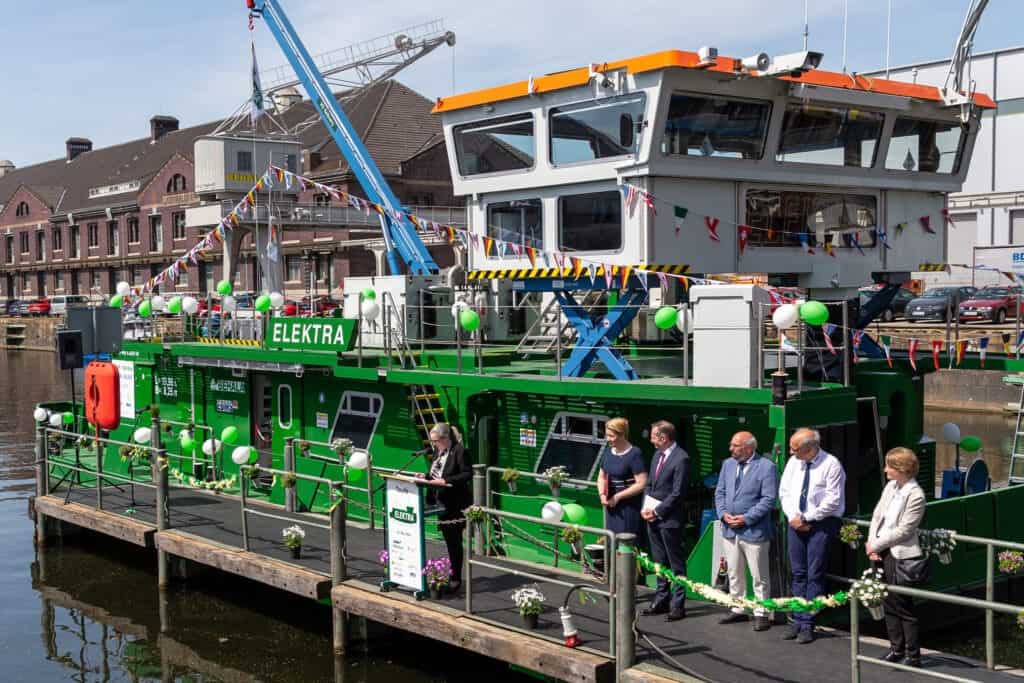In Berlin’s Westhafen today, Mayor Franziska Giffey christened the ELEKTRA. After almost two years of construction at the Hermann Barthel GmbH shipyard in Derben and transfer to the Westhafen in Berlin, now the long-term testing of this unique, innovative and emission-free pusher boat can begin.
Petra Cardinal, Managing Director of BEHALA – Berliner Hafen- und Lagerhausgesellschaft mbH, welcomed the approximately 250 guests who had gathered at Harbour basin II. They included many representatives from politics and public authorities as well as project partners and suppliers, the project executing organisation and the project coordinator, the port industry and various associations, press and members of the supervisory board and staff.
In his opening remarks, Federal Minister Dr. Volker Wissing talked about the significance of hydrogen mobility for achieving the climate protection goals of the federal government. “The ELEKTRA is a lighthouse project: It is the first pusher boat worldwide where a battery-electric drive will be combined with hydrogen and fuel cell technology. The entire project is a blueprint for climate- and environmentally-friendly inland shipping and is a true pioneering achievement not just technically, but also in terms of regulation.”
Prof. Dr.-Ing. Gerd Holbach, overall project manager from the Technical University Berlin, briefly explained the overall project, the concept and the construction design for the innovative pusher boat.
Mayor of Berlin, Franziska Giffey, uttered the phrase: “I hereby christen you ELEKTRA, wish the crew a safe journey and always a hand’s breadth of water under your keel” and christened the ship. She added: “The world’s first emission-free pusher boat is the impressive result of the collaboration of those in shipbuilding as well as energy and propulsion technology. I am particularly pleased that much of the Berlin inventor spirit has been incorporated into the development and construction of ELEKTRA. This lighthouse project is an ideal showcase for how innovative ideas can succeed in improving the climate over the long-term on our waterways. Berlin wants to be a pioneer in this area.”
Dr. Corinna Barthel from the Barthel shipyard congratulated the godmother with a bouquet and spoke about the special features of the construction of the ELEKTRA.
The Managing Director (Chair) of NOW GmbH, Kurt-Christoph von Knobelsdorff added: “The ELEKTRA is already a role model for more new ship builds and for that alone, is already a huge success story for the funding strategy of the BMDV. Considering their service lives of 50 years and beyond, the transition to climate-friendly propulsion systems in shipping must now be accelerated.”
Under the project management of the specialist area: ‘Design and operation of maritime systems’ of TU Berlin, the companies BEHALA – Berliner Hafen- und Lagerhausgesellschaft (logistics), the Hermann Barthel shipyard, BALLARD Power Systems (fuel cells), Argo-Anleg (hydrogen system), SER Schiffselektronik Rostock (electr. energy system), EST-Floattech (battery system) and HGK Shipping (nautical operation) participate as partners in the development, construction and testing of the ELEKTRA.
As the first zero-emission ship, the ELEKTRA will serve as a role model, because this energy system is conceived in such a way as to make it transferrable to many types of inland waterway and coastal ships.
It is not only energy provision for the ship’s propulsion and the pushing of the pusher units that is needed, but also power for the crew, who live, cook and wash on board. Furthermore, energy must be provided for temperature control of the rooms and the wheelhouse. The batteries also need a certain ‘comfort temperature’ for efficient operation and a long service life. This must all function with limited carried energy and without losing range.
The waste heat from the fuel cells are used by a consistent water cooling system and the rooms are heated by a brine-water heat pump. It is an advantage here that the ship can always avail of water with a temperature of over 0° C under the keel.
The use of a self-developed energy management system and a driving assistant supports the skipper and logistician in planning operations and executing the transports.
With 750 kg of usable gaseous hydrogen at 500 bars on board and a battery capacity of approx. 2,500 kilowatt hours, the ship has a range of approx. 400 kilometres in a pushed convoy with the loaded heavy freight lighter, URSUS. Therefore, along the shipping routes of Berlin towards Rhine/Ruhr, Hamburg and Stettin, there will only be one additional shore station required to provide ELEKTRA with hydrogen and electricity aside from Westhafen. In all, convoys of up to 150m long can be driven.
Both in Berlin’s Westhafen as well as in Lüneberg harbour, the first stations for the replacement of the hydrogen tanks and electric charging stations in the required performance class of 500 kilowatts will launch operation in 2023.
TU Berlin has finalised a supply agreement with the Industrie- und Gewerbepark Mittelelbe/H2 Green Power & Logistics GmbH for filling and transporting the tank systems (Multiple Energy Gas Container – MEGC) with green hydrogen until the end of the project’s term at the end of 2024.
The MEGCs can be replaced with the ship’s own crane and the electricity is connected through a charging gallows where the cables are run on the shore side. Dealing with the arm-thick cables is thus very easy for the ship’s crew and the ship can be quickly connected to the charging station, with the pier free from cables.
Initially, testing will for the most part, take place in the capital region. From 2023, testing will then increasingly be conducted in long-distance transport in the direction of Hamburg.
With a total project volume of approx. 14.6 million euros, the project is funded by the Federal Ministry for Digital and Transport (BMDV) in the amount of approx. 9.1 million euros and supervised and coordinated by Project Management Jülich (PtJ) and the National Organisation Hydrogen and Fuel Cell Technology (NOW).
Further information can be found on the website of BEHALA – Berliner Hafen- und Lagerhausgesellschaft mbH: www.behala.de







